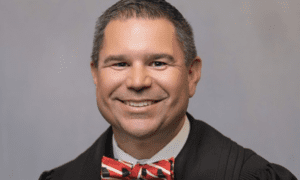A new ordinance designed to heavily restrict sexually-oriented businesses which might seek to locate in unincorporated Fayette County has drawn pushback from some residents who are concerned such businesses might come near their neighborhood.
The matter was the topic of several citizens addressing the county commission Nov. 14 including a group of a dozen members of Liberty Baptist Church as well as representatives from the North Fayette Community Association.
The ordinance limits sexually-oriented businesses to locating only on lots zoned for light industrial use, but that is why the residents expressed concern. County officials later explained that they had to find a zoning district to allow such businesses because if such a designation was not applied, a sexually-oriented business could be allowed to go anywhere in the county.
Officials noted that the county has not had such a business apply to come to the unincorporated county, but one resident complained that a similar entity has opened just outside the county near her home.
Alice Jones, vice president of the North Fayette Community Association, said no one from the county contacted her group prior to enacting the ordinance, and she said she had not read about the proposal in the newspaper either.
“We are outraged, outraged, and I urge you to revisit that decision in our community and find another location to put such establishments,” Jones said. “… I would appreciate if you would revisit that.”
Dorothy Herring of the Northridge Homeowners Association said she was concerned about sexually-oriented businesses being allowed to come to the county as a potential draw for crime.
“We’ve had several break-ins and we’re trying to guard our neighborhood and keep safe both adults and kids,” Herring said. “I’m so hopeful you will again look at the legislation … and see if there’s a way to help us protect our property value and also help us protect our citizens.”
Herring also noted that a few weeks ago there was a shooting outside a club less than a quarter mile away from her subdivision in Clayton County wehre a shooting had occurred. Herring said she has been appreciative of the crime-fighting efforts of the Fayette County Sheriff’s Office.
“We’re just being hemmed in by some really ugly things and we need you to protect us from that,” Herring said.
Gary Hagard of Liberty Baptist Church said he was strongly opposed to sexually-oriented businesses on the basis that they “demean the family.”
Hagard said the church prays for the commission daily and is not angry but rather grateful to share its opinion on the matter.
Debbie Feemster, also of Liberty Baptist and a member of the North Fayette Community Association, noted that many of the church members are older and want to know how to stop such businesses from coming here.
Specifically Feemster wanted to know the legal means which are “available to us to stop this without picketing in the rain, for this not to happen.”
Northridge resident John E. Jones asked the commission to remove the zoning requirement but keep the portions of the ordinance that have a host of requirements including the necessary permits and approvals from the county.
Jones said the zoning restriction would allow sexually-oriented businesses to locate in communities “where it’s not wanted, and I think that’s a disservice to our people.”
Jones too credited Fayette County Sheriff Barry Babb, particularly for using license plate reading cameras to help find stolen cars and potential criminals entering the county.
Commission Chairman Steve Brown noted that if residents had better ideas of a different zoning district in which to allow sexually-oriented businesses to have a low impact on the community, the commission would listen to such proposals.
Commissioner Randy Ognio said a better solution would be to have the matter addressed by the state legislature to see if such businesses can be prevented altogether.
“We don’t really have the power to prevent them, but we can try to limit them to areas,” Ognio said. “And if there’s a better way to figure out a limited area than what’s been done, I think we are all open to that, but we just have to do something, not just let them come in wherever they want to be.”
Commissioner Charles Oddo said he felt good that the commission at least has some protections in place, noting the ordinance can be changed in the future if necessary.











Leave a Comment
You must be logged in to post a comment.